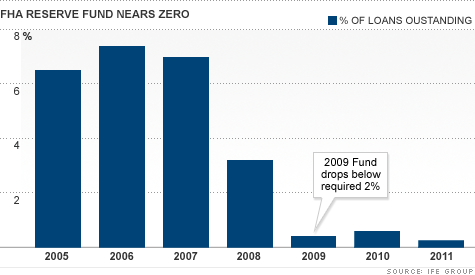Search News

NEW YORK (CNNMoney) -- Concerns are growing that the Federal Housing Administration will need to be bailed out by taxpayers.
The agency's latest monthly outlook report revealed a spike in serious delinquencies for FHA-insured loans, posing a further threat to the agency's already depleted cash reserves.
According to the report, the percentage of loans in the FHA's portfolio with three missed payments or more rose to 9.3% in November, up from 8.4% in August.
"It's highly likely that the FHA will need a taxpayer bailout over the next three to five years," said Joseph Gyourko, a real estate professor at the University of Pennsylvania's Wharton School and author of a report entitled "Is FHA the Next Big Housing Bailout?."
In November, an independent audit of the FHA's finances found that losses from mortgage defaults had depleted the agency's reserve fund to 0.24%, or $2.6 billion, during fiscal 2011 -- well below the Congressionally-mandated 2% level. (The ratio measures the net worth of the reserve fund compared with the value of the loans FHA has insured.) In 2006, the reserve fund stood at 7%.
At the time, the agency's auditor warned that if home prices continued to drop, FHA could run through the remainder of its reserves, forcing it to either seek a bailout from the Treasury Department or further increase the premiums it charges borrowers. The FHA doesn't issue mortgages, but instead insures lenders against defaults.
Such a bailout could cost billions: Guyourko argues that the FHA is so undercapitalized that it would need at least $50 billion, even if the housing markets don't deteriorate further. But even by more conservative measures, the agency would need at least $20 billion to meet the capital requirements mandated by Congress.
In early December, the House Financial Services Committee grilled Shaun Donovan, the Secretary of the U.S. Department of Housing Urban Development, over the possibility of a bailout. Donovan blamed FHA's financial woes on loans made before 2009 and said that loans issued in recent years were experiencing a "dramatic decline in the rate of early payment default." As a result of these healthier loans, he said the reserve fund would be able to return to the required 2% level in 2014.
Yet, Wharton's Gyourko argues that the FHA has underestimated the risk of these more recent loans. Many of the new serious delinquencies were from loans issued in 2009 and 2010 and he projects there will be many more defaults to come.
One reason is that many of the borrowers who took out FHA-backed mortgages during this time relied on the First-Time Homebuyer Tax Credit for down payments. A large percentage of these borrowers didn't have enough cash for the small 3.5% down payment that FHA requires, let alone the money to make their ongoing mortgage payments, he said.
The FHA said that the vast majority of home buyers who claimed the tax credit used their own cash for down payments or borrowed from relatives and are therefore low risk.
Home prices will also play a key role in whether taxpayers will have to rescue the FHA, said Guy Cecala, publisher of Inside Mortgage Finance, a trade publication.
"Given that most FHA loans are made with a 3.5% down payment, most are underwater within a year after price declines," he said.
Many FHA borrowers are teetering on the edge of foreclosure and further housing price declines will push many of those over, exposing the agency to more losses. "I think there will have to be a bailout over the next couple of years," said Cecala.
The FHA claims its total liquid assets are $400 million higher than a year ago and home prices would have to fall 4% to 5% before the agency would need a bailout. It said it has also recognized expected losses and planned for them by raising upfront insurance premiums to bolster its assets.
Still, that might be cutting it close. Home prices are projected to fall another 3% to 4% in 2012 before stabilizing, according to forecasting firm Fiserv.
For all the FHA's problems, however, it has filled a great need over the past few years, said Cecala. Low-income and first-time home buyers have relied on FHA loans to finance their purchases. Without the backing of the FHA, fewer homes would have been sold and prices would be even lower.
"The housing market would be in far worse shape than it is," he said. ![]()
| Overnight Avg Rate | Latest | Change | Last Week |
|---|---|---|---|
| 30 yr fixed | 3.80% | 3.88% | |
| 15 yr fixed | 3.20% | 3.23% | |
| 5/1 ARM | 3.84% | 3.88% | |
| 30 yr refi | 3.82% | 3.93% | |
| 15 yr refi | 3.20% | 3.23% |
Today's featured rates: